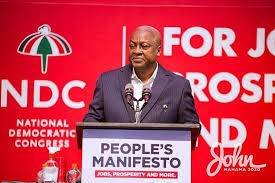Former President John Dramani Mahama has reiterated his commitment to scrap the controversial Electronic Transaction Levy (E-Levy) and the newly introduced betting tax within the first 120 days of assuming office if he wins the 2024 presidential elections. This bold pledge comes as part of his broader economic vision aimed at alleviating the financial burdens on Ghanaians and promoting economic inclusivity.
The E-Levy, introduced by the Akufo-Addo administration in 2022, imposes a tax on electronic money transfers and other digital transactions. While the government justified the levy as a means to expand the tax net and generate revenue, its implementation has faced widespread backlash, with critics describing it as regressive and counterproductive in a digital economy. Similarly, the betting tax, introduced in 2024, has been criticized for stifling the burgeoning sports betting industry and further burdening the youth, many of whom rely on betting as a form of entertainment and potential income.
Speaking at a recent campaign event, Mahama emphasized the adverse effects these taxes have had on ordinary citizens and businesses. "The E-Levy has not only discouraged digital transactions but has also stifled innovation in the financial sector," he noted. "Scrapping it will restore confidence in our digital economy and ease the financial strain on Ghanaians."
On the betting tax, Mahama stated that while his government acknowledges the need for revenue generation, taxation policies must be balanced and fair. "We cannot overburden the youth while failing to address systemic inefficiencies in revenue collection," he remarked.
Mahama’s promise has been welcomed by many, particularly the youth and small business owners who have borne the brunt of these taxes. However, critics question the feasibility of this pledge, citing the country’s high debt levels and fiscal challenges.
As the December 2024 elections draw closer, Mahama’s vow to repeal these unpopular taxes is expected to be a key campaign message. It positions him as a leader who listens to the grievances of the people and is committed to pursuing policies that foster economic growth and equity.




No comments yet
Be the first to share your thoughts!